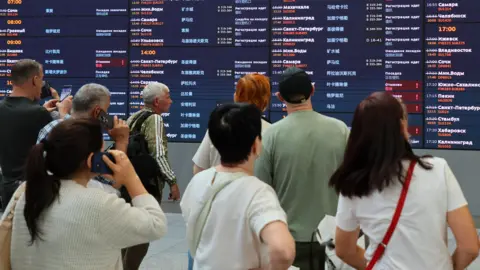Drone strikes disrupted major airports serving Moscow on Monday, creating widespread delays, long lines, and crowded terminals as travelers faced a wave of flight cancellations and rescheduling. Chaos unfolded across the capital’s air transport network as travelers were left with few options—many waiting for hours or sleeping on floors with their luggage.
Authorities reported intercepting over 100 drones overnight, including dozens targeted specifically at the Moscow region. The wave of aerial activity prompted a heightened security response and the temporary suspension of flights at multiple international and domestic airports serving the Russian capital.
Thousands Grounded as Airports Suspend Operations
Airports including Sheremetyevo, Domodedovo, and Vnukovo were forced to ground planes, divert flights, or close runways during the early morning hours. Travelers found themselves stuck in long queues as staff attempted to manage the volume of affected passengers. Screens across terminals showed rows of canceled or postponed departures, while public announcements urged passengers to remain patient amid the uncertainty.
Reports from the ground revealed scenes of passengers sleeping on cold tile floors, with families huddled together and travelers using backpacks as makeshift pillows. Others remained standing in line at ticket counters in hopes of rebooking their journeys.
The airspace restrictions were lifted gradually throughout the day, but not before delays stretched into the evening. The volume of impacted flights led to a backlog that is expected to take days to fully resolve.
Intensified Drone Defense in Moscow Region
The drone attacks appear to be part of a broader escalation in aerial incursions targeting critical infrastructure and urban centers. While no major damage was reported, the incident underscores the growing threat drones pose to civilian air travel and infrastructure. Defense systems reportedly intercepted the vast majority of the drones, with many destroyed at high altitude or neutralized before reaching urban areas.
The targeted strikes come amid an uptick in tensions across multiple fronts, raising concerns about the safety of Russian cities and their preparedness to respond to continued aerial threats. Air defense deployments have become more frequent in the capital, with some military assets now stationed near airports, rail hubs, and government buildings.
Civilian Impact and Growing Fatigue
For many residents and travelers, the frequent alarms, sirens, and sudden closures are becoming a harsh part of daily life. Travelers expressed frustration over the lack of timely updates and the strain placed on families and business activities.
“I’ve been here for 14 hours,” said one passenger, holding her child and a carry-on bag. “There’s no food left, and we still don’t know when we can fly out.”
Hotel rooms near the airports were quickly booked, with prices spiking due to increased demand. Public transportation hubs also experienced disruptions as travelers scrambled for alternate routes.

